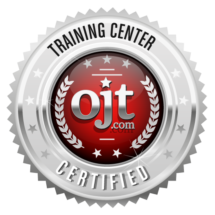
INDUSTRY-LEADING LIVE
INSTRUCTOR-LED TRAINING
World Class Training Content, Delivered On-Demand
BRIDGING THE GAP
between career seekers
& employers
from COAST-TO-COAST

World Class Training Content, Delivered On-Demand
between career seekers
& employers
from COAST-TO-COAST
Production Manager
QUALIFICATIONS
A Bachelor’s or Master’s Degree in business administration or industrial engineering, encompassing a 4-year requisite study and practice credit hours; with Professional certifications and credentials like Certified Manufacturing Engineer (CMfgE), Certified Manufacturing Technologist (CMfgT), Manufacturing Management Certification (CTME) , Certification in Production and Inventory Management (CPIM), Certified Product Marketing Manager (CPMM), Certified Associate in Project Management (CAPM), Certified Project Manager (CPM) and Master Project Manager (MPM) etc.; combined with – On the Job Training (OJT) programs, Apprenticeships, Production Workforce Job Training or Experience; covering manufacturing and industrial work topics including operations planning & strategy, workflow, manufacturing processes, scheduling and productivity, production planning & control, product & process design, inventory management and control, operations research, quality assurance and quality control (QA/ QC), specifications, standards and practices, planning, coordinating, budgeting, industrial engineering and project management; sourcing & purchasing, handling materials, capacity utilization and management, estimation, facilities and workshops, statutory requirements, environment protection safety protocols and industrial best practices; applications, design, integration, installation, commissioning, and maintenance of plant, equipment and machinery infrastructure, tools, equipment, and allied materials, and safety protocols. A 2 to 4-year industry work experience, an MBA or a Post Graduation in Science, Technology, Engineering or Mathematics (STEM) or a Master’s Degree in manufacturing or industrial engineering, and project management will be an added plus.
AVERAGE ANNUAL PAY
(Credits: www.payscale.com)
| Entry-level (0-12 months) | $ 58,715 |
| Early career (1-4 years) | $ 63,749 |
| Mid-career (5-9 years) | $ 71,448 |
| Experienced (10+ years) | $ 76,843 |
PROJECTED GROWTH
(Credits: www.bls.gov)
Production Manager is an exciting career pathway, in which employment is expected to grow at a marginal 1 percent from 2019 to 2029.
SKILLS/ TRAITS NEEDED
Besides engineering and/or management qualifications, experience, and skills, the Production Manager needs to be a quintessential multi-tasker; self-driven, result-oriented with strategic, creative, critical, and lateral thinking; with strengths in planning, analysis, design, visualizing, computation, and problem-solving skills, leadership, and strong scientific aptitude; tracking the emerging technologies & industrial trends with in-depth knowledge in the field of industrial and manufacturing engineering, processes, workflow, estimation, materials, sustainability, standards & best practices, sourcing & purchasing, handling materials, capacity utilization, inventory management, cost control, the statutory and safety protocols, project management and documentation. Ability to work under pressure ability in a fast-paced work environment, a cool temperament, resilience, delegation, tactfulness, extreme focus, memory, attention to detail, math & technical acumen and computer software knowledge, strong written and verbal communication, people/ project/ risk/ conflict and time management, prioritization, reporting, inter-personal & soft-skills, memory, patience, and perseverance, are the vital ingredients of a successful of the Production Manager.
WORK FUNCTIONS
Production Managers supervise, coordinate, control, and manage manufacturing and production facilities; planning, controlling, ensuring quality standards and compliance to technical specs; reviewing work progress, oversight and status reporting, risk management, equipment and materials procurement, and organizing production operations. Apart from this, they also design and develop processes, policies, and procedures, obtain statutory approvals from regulatory authorities and implement various environment protection safety protocols, to ensure smooth manufacturing and production operations and lower cost of production; ensuring profitability and business continuity, quality assurance and quality control (QA/ QC), identifying and resolving technical pain points and implementing strategic, cost-effective, innovative and robust product and industrial solutions. Besides, they are also responsible for the team and people management; including recruiting, training, coaching, delegating and appraising labor and employee work performance; hiring and handling contractors, cash flow and cost control, preserving assets, facilitating manufacturing or production audit, and handling production budgets effectively and efficiently; to ensure higher productivity, smooth operations, workflow, and completion of the project or production targets. They may also contribute towards organizational policy frameworks, besides leading the efficiency and costs savings goals of the organization through meticulous planning and execution, aligned to the organizational goals. They may be needed to work in shifts.
Related Careers